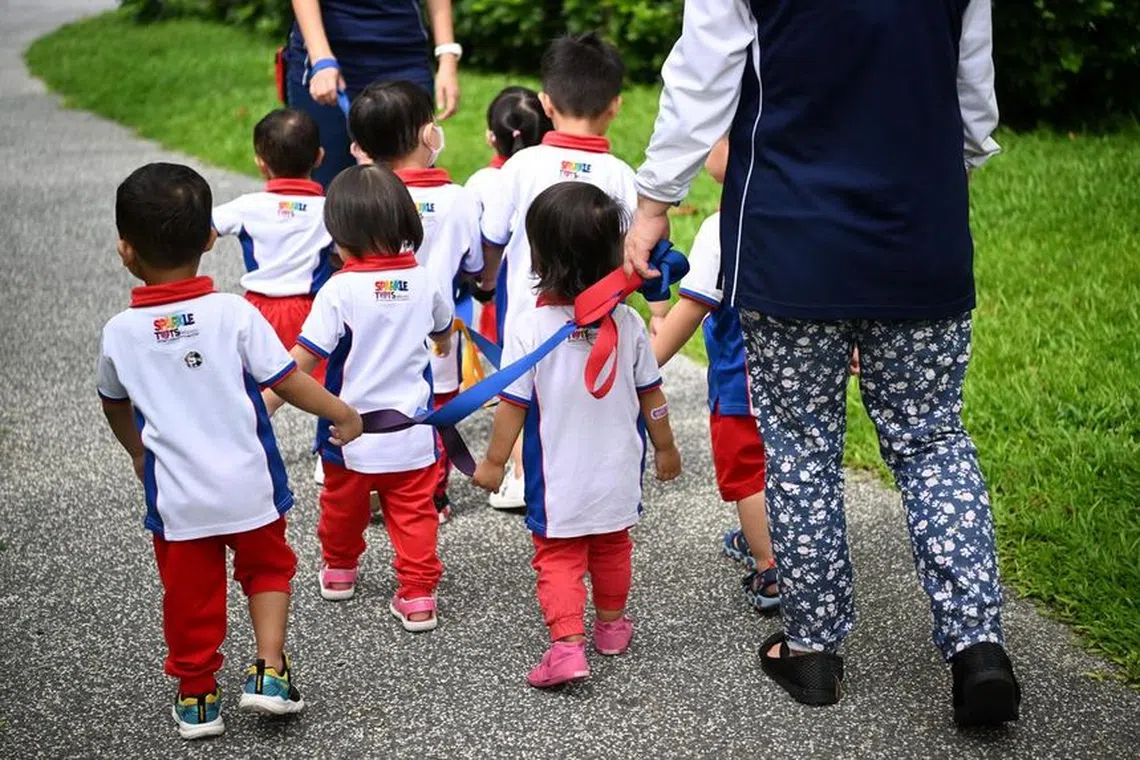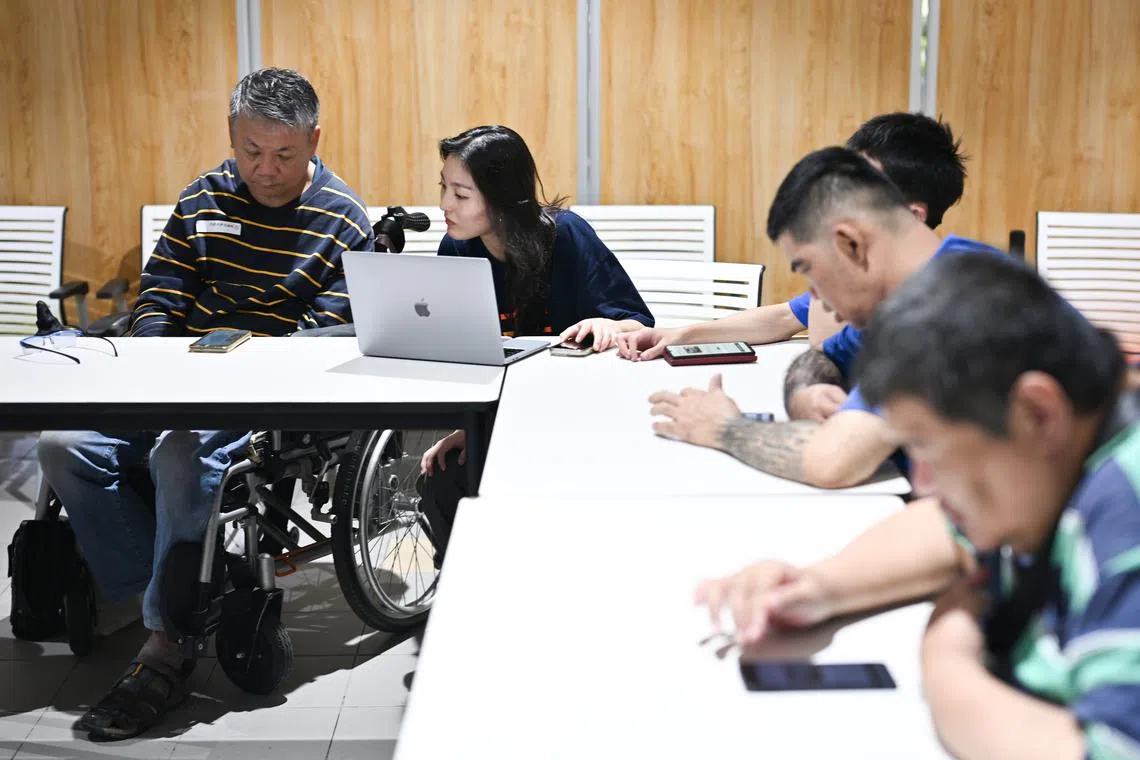2024 wrapped: The biggest social stories of the year, and what’s next
SINGAPORE – From the introduction of 10 weeks of shared parental leave to another baby care option in the form of childminders, The Straits Times looks at the biggest social news in 2024 and what families can expect in the new year.
From Jan 2, 2025, an emergency response team from the Ministry of Social and Family Development (MSF) will also be able to issue emergency orders to stop family violence immediately.
1. Childminding pilot
Parents with babies aged from two months to 18 months now have another infant-care option, following the launch of a new childminding pilot by the Government.
The childminding pilot, which will run for three years, was first announced in March by Minister of State for Social and Family Development Sun Xueling.
Since Dec 1, childminding operators EduNanny by Butler, Kidibliss and NannyPro Care have provided services under the pilot.
The programme aims to grow childminding services to be an affordable, safe and reliable infant caregiving option for parents, the Government said.
It allows parents to choose the number of days a week they need help and opt for more flexible hours, compared with leaving children for a fixed period of time at infant-care centres.
2. Stopping domestic violence

The number of new Tier 1 child abuse cases, defined as those with low to moderate safety and risk concerns, rose from 2,760 in 2022, to 2,787 in 2023.PHOTO ILLUSTRATION: ST FILE
In September 2024, MSF released its inaugural Domestic Violence Trends Report which showed a growing number of spousal violence and less severe child abuse cases.
In 2023, there were 2,008 new spousal violence cases, up from 1,741 cases in 2022.
The number of new Tier 1 child abuse cases, defined as those with low to moderate safety and risk concerns, rose from 2,760 in 2022, to 2,787 in 2023.
MSF attributed the growing number of cases to greater awareness and reporting of family violence, coupled with better detection of such violence.
From Jan 2, 2025, officers from a 24-hour emergency response team will be given the power to issue emergency orders at the scene of high-risk domestic violence cases, which will immediately stop abusers from committing further violence.
The Domestic Violence Emergency Response Team (Dvert), which comprises MSF staff trained in areas such as social work and psychology, responds to high-risk domestic violence cases together with the police.
Dvert officers can issue emergency orders, which may include one or more of the following orders:
- Stay Away Order, which bars the abuser from being in the victim’s vicinity.
- Domestic Exclusion Order, which bars the abuser from the victim’s home.
- No Contact Order, which prohibits the perpetrator from visiting or communicating with the victim, including through social media.
Other amendments to the Women’s Charter will also take effect on Jan 2, 2025.
For example, besides physical abuse, other forms of violence such as sexual, emotional and psychological abuse will also be considered family violence.
Egregious forms of controlling behaviour, which some countries call coercive control, will be considered emotional or psychological abuse under the amendments.
3. Supporting low-income families
Since August, families under the ComLink+ Progress Package for Pre-school have been able to receive incentives when they enrol their children in pre-school and ensure that the children attend regularly.
For instance, each child enrolled in pre-school will get a one-time $500 top-up to the Child Development Account (CDA) in the year he or she turns three.
Children between the ages of three and six will get a $200 top-up to their CDA every three months if they attend pre-school regularly. The CDA is a special savings account for children that can be used to pay for pre-school and other fees.
The ComLink+ scheme, unveiled in 2023, is a push by the Government to boost social mobility for low-income families with children.
Under it, such families get financial incentives and other support if they take steps to better their lives in four areas: early education, home ownership, employment and debt clearance.
There were over 9,000 families on the scheme as at December 2023.
The Progress Package for Pre-school was the first to be rolled out in August 2024.
The next three packages – which aim to spur families to hold on to a stable job with Central Provident Fund (CPF) contributions, encourage them to save up to buy an HDB flat, and help them clear their debt – will be progressively rolled out from the end of 2024.
For example, under the employment package, beneficiaries get between $450 and $550 every three months in a mix of cash and CPF payouts if they find a CPF-paying job with a salary of at least $1,400 a month, among other incentives.
An MSF report in November found that only 42 per cent of families on the ComLink+ scheme were considered stable. This means that they have met all the indicators for stability, including enrolling their children in pre-school and being in stable employment. The report, which provided baseline data of the scheme’s families, also found that the majority of children from the ComLink+ families did not attend pre-school regularly.
Looking ahead
1. Shared parental leave
Parents-to-be will get another 10 weeks of shared leave on top of their current leave entitlement, bringing the total amount of government-paid parental leave to 30 weeks by April 1, 2026.
The two extra weeks of voluntary paternity leave will also be made mandatory from April 1, 2025, meaning that employers must grant such leave applications.
The changes are being made in response to feedback that parents would like more time with their children, and to encourage dads to play a bigger role.
In short: Mums will get 16 weeks of maternity leave, while dads will get four weeks of paternity leave. On top of that, parents will have 10 weeks of leave to be shared between them. This works out to around 7½ months of paid leave for parents of Singaporean babies.
To give employers time to adjust, changes to the shared parental leave scheme will be made in two phases, starting with six weeks of shared leave from April 1, 2025, then the full 10 weeks from April 1, 2026.
2. Expansion of infant care and childcare

The 40,000 new infantcare and childcare places by 2029 will add to the 60,000 opened up in the last decade.PHOTO: ST FILE
Close to 40,000 new infant-care and childcare places will be made available by the Early Childhood Development Agency (ECDA) and five anchor operators from 2025 to 2029, amid efforts to improve access to affordable and quality pre-schools in Singapore.
This includes about 6,000 new infant-care places to cater to increased demand from families.
Minister for Social and Family Development Masagos Zulkifli said in November that this move will ensure that government-supported pre-schools can cater to 80 per cent of pre-schoolers in the medium term, up from more than 65 per cent currently.
The 40,000 new places by 2029 will add to the 60,000 opened up in the last decade.
From January 2025, full-day childcare fee caps at anchor and partner operators will also be reduced by $40 to $640 and $680 per month, respectively.
Since Dec 9, all lower-income families with a gross monthly household income of $6,000 and below have also newly qualified for the maximum amount of childcare subsidies for their income tier.
This means that parents can expect to pay $3 to $115, or up to 2 per cent of their income, for childcare at anchor operators, with further reductions in 2025. This will benefit more than 17,000 additional children.
To make the pre-school subsidy application more seamless, parents can apply for subsidies directly to ECDA online, instead of through pre-schools, via government mobile app LifeSG. This new process is being gradually rolled out from Dec 9.
Parents can also now locate pre-schools more easily with a new search feature on the same app, allowing them to shortlist centres within 2km of their homes.
3. Enabling Masterplan

Adults with disabilities will also receive support to live independently in the community in the coming years, alongside care and coaching services to meet their needs.ST PHOTO: LIM YAOHUI
An estimated 4,500 more people with disabilities (PWDs) in Singapore are expected to have jobs by 2030, as part of efforts to increase the employment rate of this group to 40 per cent.
A task force looking at ways to reach this goal announced its recommendations in a report in September, laying out plans to grow the pool of inclusive employers, expand employment opportunities for PWDs and better equip job coaches.
The Government aims to increase the number of inclusive employers from more than 7,000 today to 10,000 by 2030, of which 3,000 will hire more than one PWD each.
Adults with disabilities will also receive support to live independently in the community in the coming years, alongside care and coaching services to meet their needs.
Up to 250 individuals will join a pilot called the Enabled Living Programme from 2025 to 2028, where they will live in a cluster of Housing Board rental flats or be supported in their own homes.
Help could include coaching in social skills, care support for daily living activities and on-site monitoring, depending on their needs.
- Theresa Tan is the senior social affairs correspondent at The Straits Times. She covers issues that affect families, youth and vulnerable groups.
- Shermaine Ang is a journalist at The Straits Times, covering social issues in Singapore.
- Syarafana Shafeeq is a social affairs journalist at The Straits Times.
Join ST’s WhatsApp Channel and get the latest news and must-reads.

